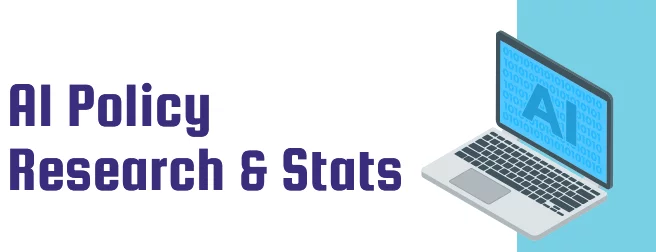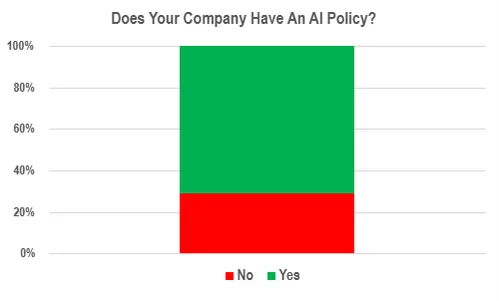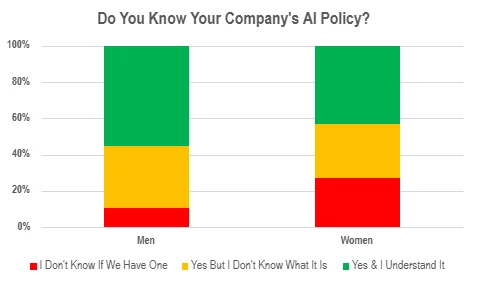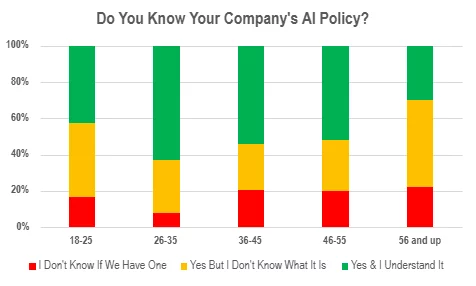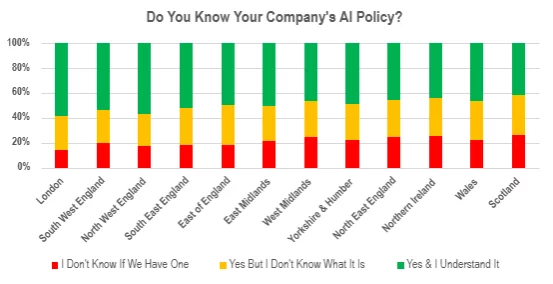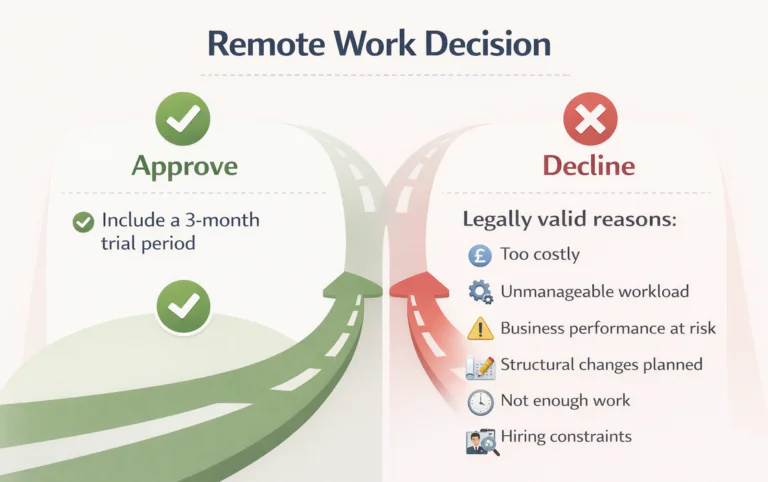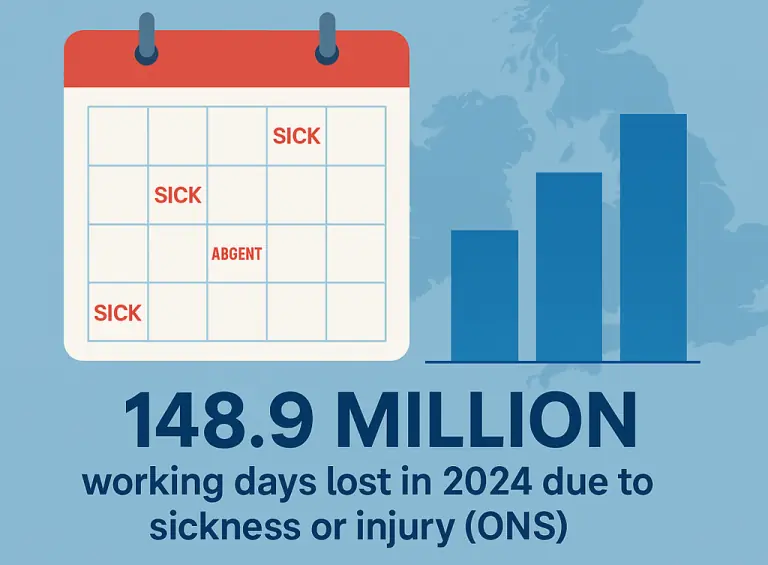
AI Policy Research & Statistics
Contents
Everyone is talking about AI – but how many people understand how it will be controlled and implemented day-to-day in the workplace?
The results of our survey were concerning, showing distinct inequalities between men and women, between older workers and younger workers and between workers in different parts of the UK.
Employers and HR departments are failing to effectively communicate their approach to AI to employees.
Key Takeaways: AI Research
Only 71% of companies have an AI policy, 29% have no AI policy in place.
Women (24.6%) are more than twice as likely as men (11.5%) to not know if their company has an AI policy.
Older workers (>55) are more than twice as likely as younger workers (26-35) to know their company has an AI policy but be unaware of it is. 14.3% versus 6.4%
Workers in London are most likely (46.1%) to understand their company’s AI policy, with workers in Manchester and the North-West the second most likely (43.1%). Workers in Scotland (29.2%) and Wales (31.3%) are least likely to know.
Among the youngest workers (18-25), 40.7% know their company has a policy but don’t know what it contains, suggesting that inexperience in the workplace may be a factor for these digital natives.
Why It Matters: A Summary
Despite 71% of UK companies claiming to have an AI policy, our data shows that large groups of workers are unaware these policies exist, or if they know there is one they don’t know what it actually says.
Women are over twice as likely as men to be in the dark about whether their company has an AI policy.
Older workers more than twice as likely as younger colleagues to not know if an AI policy exists, and almost twice as likely to know their company has an AI policy but not what it is. We know how many people are using AI in today’s workplace, so how can there be such a confusion on the policy?
London and the North-West lead in awareness, but regions like Scotland and Wales are significantly behind.
These findings highlight a growing inequality in how AI is communicated and understood inside UK workplaces — and raise urgent questions for HR and business leaders.
“This study highlights the need to ensure all employees—across ages, genders, and locations—can benefit from AI innovation. Building this inclusive awareness isn’t just good governance—it’s how organisations unlock the full potential of their people, data and technology working together.” Dr. Eva van der Brugge, Pandria
There is incredible potential in AI, which is why we started running our own Copilot courses to help people get going. Companies need to start publishing clear guidelines, so people can start using these amazing tools with confidence!
Does Your Company Have An AI Policy?
We started with the simplest question – does your company have an AI policy?
71% said yes, their company does have an AI policy and 29% said no, their company doesn’t have an AI policy.
Given that larger companies are far more likely to have clearly set out and communicated policies, this is perhaps not the surprise we initially found it to be.
Outside the Government where AI policies were put in place during 2024 and early 2025, 53% of the UK’s workforce works for the largest 1.2% of the UK’s businesses, all of which are likely to have AI policies.
Gender Disparity: Men Vs Women
When we analysed our data more deeply, we began to find some concerning inequalities.
Women are far less likely to know and understand their employer’s AI policy.
They are
- More than twice as likely (213%) to be in the dark about if their employer has an AI policy, and
- 36% less likely to know and understand their employer’s policy, if there is one.
Age Disparity: Comparing By Age Group
Next, we broke down our data by age group, and again we found concerning inequalities.
We expected in general, younger workers have a better understanding of AI than older workers, because they are more likely to use it. However, we were surprised by the size of the differences.
Unsurprisingly, 26 – 35-year-olds were the most likely to understand their employer’s AI policy, with understanding reducing as workers got older or younger.
When compared with older workers (56 +), older workers are almost 3x more likely (275%) to not know if their employer has an AI policy. Also, if older workers know that their employer has an AI policy, they are more than 50% more likely (65%) to not know what it says.
Interestingly, the youngest workers were also very likely (40.7%) to know that their employer has a policy but not know what it contained, perhaps showing their lack of workplace experience.
Geographic Disparity: Comparing Different Regions Of The UK
Finally, we analysed our data by geographic region.
Given the proportion of professional services firms in London, it wasn’t a surprise to see that it had the largest proportion of employees who knew and understood their employers AI policy.
What did surprise us was that North-West England outperformed the South-East and South-West.
Having the second-highest proportion of employees who knew and understood their employer’s AI strategy, perhaps driven by the number of professional services firms based in Manchester.
Conclusion: A Stark Divide in AI Awareness at Work
This research reveals a troubling gap in AI policy awareness across the UK workforce—one that risks leaving large segments of employees behind as AI reshapes the world of work. With AI being such a powerful tool – it needs to have proper guidelines put in place, and explained clearly to employees. With it, they can start using AI to learn Excel and other essential office softwares at incredible speed.
Despite 71% of UK companies reporting that they do have an AI policy, nearly one in three employees say their organisation has no policy at all. Even more striking are the disparities in understanding across gender, age, and geography:
Women are more than twice as likely as men to be unaware of their employer’s AI policy (24.6% vs. 11.5%).
Older workers (56+) are over twice as likely as younger colleagues (26–35) to say they don’t know if a policy exists (14.3% vs. 6.4%).
London leads AI policy understanding at 46.1%, while workers in Scotland (29.2%) and Wales (31.3%) trail significantly behind.
These figures raise serious questions about how well employers are communicating critical AI changes internally—and whether current efforts are reinforcing rather than reducing workplace inequalities.
“This is an international issue. We see issues with the clear communication of corporate AI policies across all the countries we work in, the UK is not unique. Almost universally, employers need to work harder to clearly communicate their AI policies.” Robbin Schuchmann, Employ Borderless
With AI poised to impact every industry, businesses can’t afford to leave their people in the dark. If employers don’t improve transparency and training around AI policies, they risk deepening digital divides in their own organisations.
Survey Details:
Survey carried out March & April 2025.
2,500 respondents were 18 years old and up, based in the UK and in full-time office employment.
Survey sample split by geographic region in the UK:
London, South West England, North West England, South East England, East of England, East Midlands, West Midlands, Yorkshire and the Humber, North East England, Northern Ireland, Wales, Scotland
- Facebook: https://www.facebook.com/profile.php?id=100066814899655
- X (Twitter): https://twitter.com/AcuityTraining
- LinkedIn: https://www.linkedin.com/company/acuity-training/
